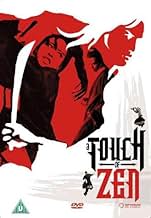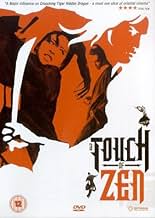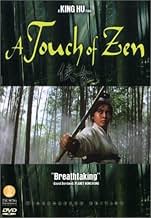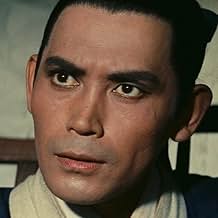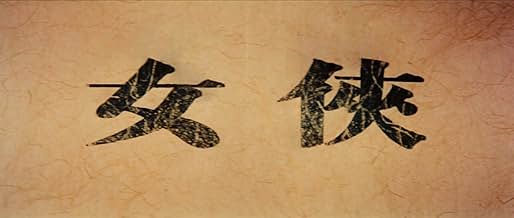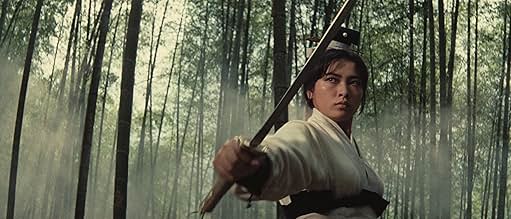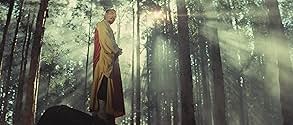A lady fugitive on the run from corrupt government officials is joined in her endeavors by an unambitious painter and skilled Buddhist monks.A lady fugitive on the run from corrupt government officials is joined in her endeavors by an unambitious painter and skilled Buddhist monks.A lady fugitive on the run from corrupt government officials is joined in her endeavors by an unambitious painter and skilled Buddhist monks.
- Awards
- 2 wins & 1 nomination total
- Director
- Writers
- All cast & crew
- Production, box office & more at IMDbPro
Featured reviews
Despite the epic length, it doesn't feel like a traditional epic. It more felt like two - or maybe even three - plots sort of smooshed together. And on top of that, each third of the film is very distinct. The first third has no action and is sort of like a period drama/mystery. The second third is more straightforward martial arts fare, feeling very similar to another of King Hu's films, Dragon Inn (which isn't necessarily a bad thing). The final third retains the action but takes thing in a really interesting surreal/spiritual/maybe even psychological direction. It's hard to put into words, but it leaves an impact.
I wouldn't call this poorly written, but the distinctive acts and more than one plot all combined together did create something of a disjointed feeling. It didn't make the movie harder to get through, as I only realised it wasn't entirely cohesive right at the end, but it's worth mentioning. The first third might have been a tad slow, too. But after an hour, there's no point where it feels like things drag.
Thankfully everything else is close to perfect. For starters, it's visually stunning. It has some of the best lighting I think I've ever seen, with night scenes looking realistically dark (without things being impossible to see), and all the scenes during the day are just gorgeous. All the great landscapes help, too.
The action satisfies and all the performances and characters are quite good. Very good music, too. On a rewatch I might not be bothered by some of those unusual screenplay decisions, but even with that minor criticism, this is still an amazing movie, and probably among the best martial arts movies I've ever seen.
What I especially like about it is that it starts off as something totally different but eventually ends as am adventurous movie, with lots of material arts fights in it. It's a long movie (about 3 hours) so it takes its time to slowly set things up and let stuff develop into something different. This ensures that the movie is always slowly but gradually developing and also never stands still, so there is never being an actual slow moment in this movie.
As the story develops, things also definitely get more interesting and fun to watch. The movie turns into a real adventure, in which the main characters are almost constantly traveling and having encounters with people that want to take their lives. This ensures that there is also plenty of action to enjoy in this movie, involving sword fights but also plenty of hand-to-hand combat, with every now and then Wire Fu effects involved.
It's also being a real innovative and original movie at times with some of its editing and camera techniques. In that regard this is also being a real '70's flick, a period in which a lot of experimenting with editing and cinematography was going on. Especially the cinematography is great at times and also does a good job at capturing the right mood and brining the environments very lively to the screen.
It's just the sort of movie not an awful lot is being wrong with. It does everything well and within its genre it's being a great watch!
9/10
http://bobafett1138.blogspot.com/
Its panoramic nature sequences have not only esthetic value, but are also symbolically relevant. In fact if one wanted to do this, it would be possible to interpret the whole movie as an allegory of human existence. Fortunately there is really no need to get out the heavy guns of symbolism and artistic value to convince oneself that Hsia Nu is a great movie. It is gripping and entertaining, amusing and serious, and infused with a pathos hardly ever encountered in European (or American) movies. Pathos of course is something difficult to handle, but the director and cast of Hsia Nu manage it very well. The film has its deliberate light moments, but it never invites laughter at its moments of pathos.
Of course we are talking here about a martial arts movie. And indeed, the fighting sequences are brilliantly done - there definitely has been no progress since 1969 - but there is not only that. There is in fact not all that much fighting if one considers that this is a three hour film, and the fights do not carry the plot. In some sense Hsia Nu resembles more a Japanese samurai drama than what we more customarily associate with the Hong Kong and Taiwan martial arts genre.
The plot is very long and complex - though perfectly understandable, and even logical - therefore I do not see any real interest in retelling it here. Suffice to say that it contains most principal human emotions: loyalty and treason, love and revenge, hunger for happiness and for...enlightenment. The acting is brilliant, and especially a more masterly 'great master' character, a monk in Hsia Nu, would indeed be difficult to find in any martial arts movie.
If anybody is not convinced by the merit of the martial arts genre and just wants to give it a sole and unique chance, then this is the movie that might convinced such a snob that cinematographic 'art' is not necessarily grey, quiet and slow, but can be colourful, vibrant and full of pathos.
I saw the widescreen/subtitled 177 mins version, although it is 3 hours long it is not boring, it keeps your attention throughout. The fight sequences I did not find particularly thrilling except for the monks (they were exceptional). The film is a little too dark, not enough sunshine. The photography is excellent especially given the film was made in '69. You can see the similarity with the modern day "crouching tiger hidden dragon" Ang Lee has said he was inspired by this film. If you ever get a chance to see this make sure you do.
P.S.
This movie is awesome. A magical experience caught on celluloid. A true treasure.
Did you know
- TriviaDirector King Hu had a full village constructed for the opening half of the movie, and then left it alone for nine months to give it a weathered look.
- GoofsThe film is set in the 14th century AD. However, the Gu family have maize (corn) drying outside their house - this crop is American in origin and did not reach China until the 16th century.
- Quotes
Ku Shen Chai: Have you seen Miss Yang, the lady who lives here?
General Shih Wen-chiao: No, I'm blind.
Ku Shen Chai: Forgive me.
General Shih Wen-chiao: Miss Yang and her mother are gone.
Ku Shen Chai: Mr. Shih! She said you should run for your life too. Do you know where she went?
Ku Shen Chai: I have to find her!
[Shih pulls out a sword as two soldiers fly down from the sky and attack, but are quickly killed in a few brief strokes of the sword]
Ku Shen Chai: Mr. Shih! Mr. Shih, who are you really?
General Shih Wen-chiao: I'm not blind, that's for sure.
- Alternate versionsA Touch Of Zen was originally released in Taiwan in two parts with a total running time of 3 hours 20 minutes. However, the bamboo forest sequence which ended part one was reprised at the beginning of part two, adding over 20 minutes to the total running time. When the two parts were combined by King Hu without any repeated scenes in 1975, the resulting total time was 3 hours. The 2015 4K restoration from the original negative runs 2 hours 59 minutes.
- ConnectionsFeatured in La menace (1977)
- How long is A Touch of Zen?Powered by Alexa
Details
- Release date
- Countries of origin
- Language
- Also known as
- Les héroïques
- Filming locations
- Taroko National Park, Hualien, Taiwan(monastery and river canyon)
- Production companies
- See more company credits at IMDbPro
- Runtime3 hours 20 minutes
- Sound mix
- Aspect ratio
- 2.35 : 1
Contribute to this page



